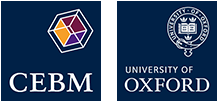Transmission of COVID-19 in South Korea.
Transmission potential and severity of COVID-19 in South Korea.
Spencer EA, Jefferson T, Heneghan C.
https://www.cebm.net/study/covid-19-transmission-of-covid-19-in-south-korea/
Published on June 16, 2020
Included in
Transmission Dynamics of COVID-19
| Reference |
Shim E, Tariq A, Choi W, Lee Y, Chowell G. Transmission potential and severity of COVID-19 in South Korea. Int J Infect Dis. 2020;93:339‐344. 2020 |
| Study type |
|
| Country |
South Korea |
| Setting |
Case data from Centers for Disease Control and Prevention |
| Funding Details |
Korea government (2018R1C1B6001723) |
| Transmission mode |
Superspreading, Person to person |
| Exposures |
Church services, gyms, pilgrimages |
Bottom Line
The transmission of SARS-CoV-2 in South Korea was exacerbated by super spreading events in confined settings, including a hospital, a church and a gym.
Evidence Summary
- The first case in South Korea was identified on Jan 20th 2020, and increase rapidly on Feb 19th: 6284 confirmed COVID-19 cases were reported as of Mar 6, 2020.
- The rapid spread was attributed to one case form a church service in the city of Daegu that was linked to a superspreading event that led to more than 3900 secondary cases
- Three other clusters were identified including one set in a hospital (118 cases), one in a gym (92 cases), and one Pilgrimage (49 cases). These few clusters have become the primary driving force of the infection.
- 33 cases were found to be imported.
What did they do?
The researchers obtained case data from Korea Centers for Disease Control and Prevention (KCDC); final data collection 6 March 2020. The data included the dates of reporting for all confirmed cases, the dates of symptom onsets for the first 28 reported cases, and whether it was local or imported.
Study reliability
Evidence from super spreading cases can lack information from other contacts that may contaminate the infected case data. This is particularly important when there are asymptomatic infectious individuals and in the early stages of outbreaks when many infected cases may go undetected.
| Clearly defined setting |
Demographic characteristics described |
Follow-up length was sufficient |
Transmission outcomes assessed |
Main biases are taken into consideration |
|
Yes |
Yes |
Yes |
Yes
|
Unclear |
What else should I consider?
This is the first study that assessed the transmission of COVID-19 in Korea, and will likely be replicated.
About the authors
Carl Heneghan
Carl is Professor of EBM & Director of CEBM at the University of Oxford. He is also a GP and tweets @carlheneghan. He has an active interest in discovering the truth behind health research findings
Elizabeth Spencer
Dr Elizabeth Spencer; MMedSci, PhD. Epidemiologist, Nuffield Department for Primary Care Health Sciences, University of Oxford.
Tom Jefferson
Tom Jefferson, epidemiologist.

